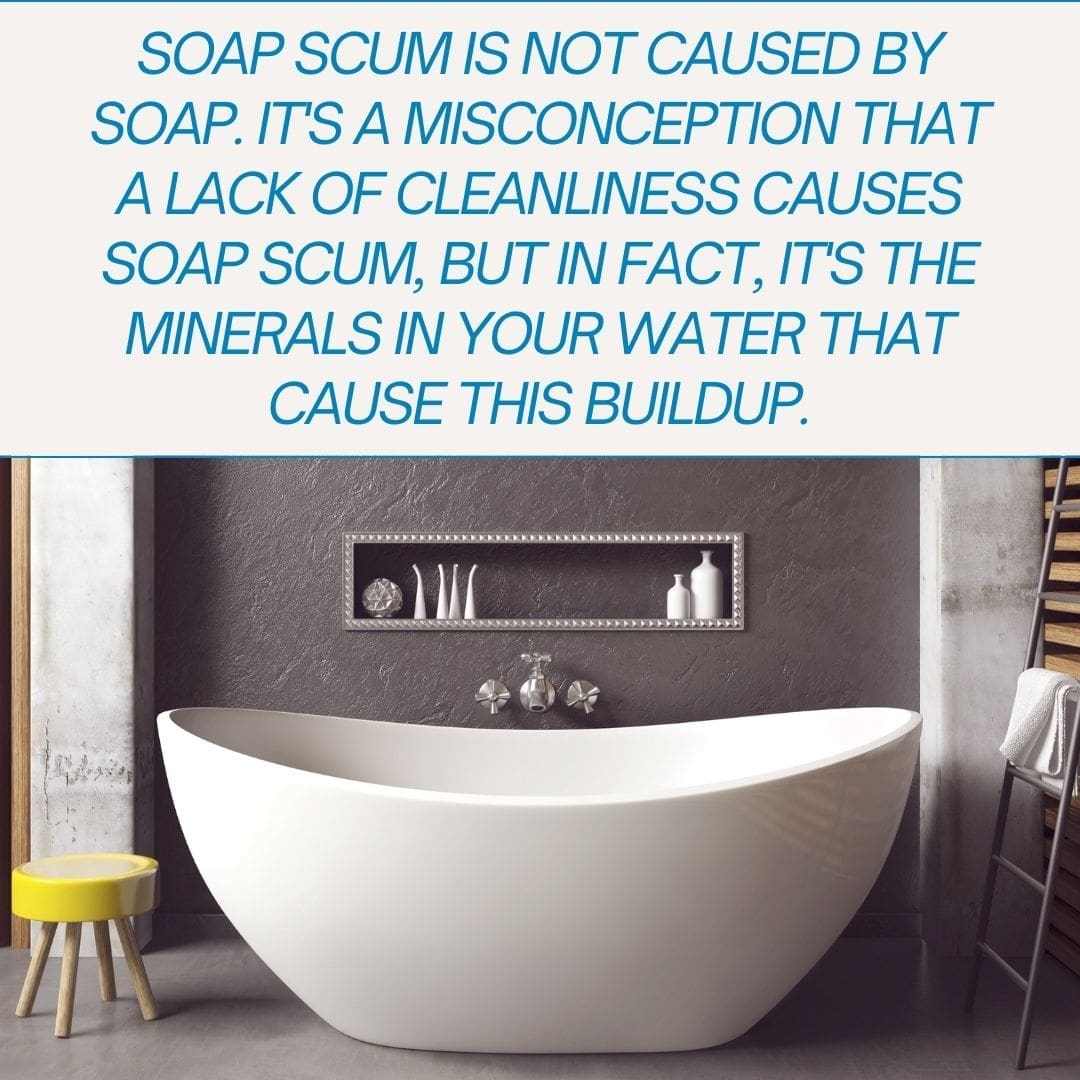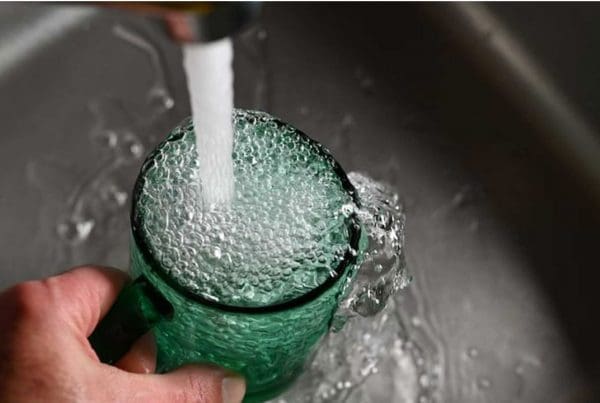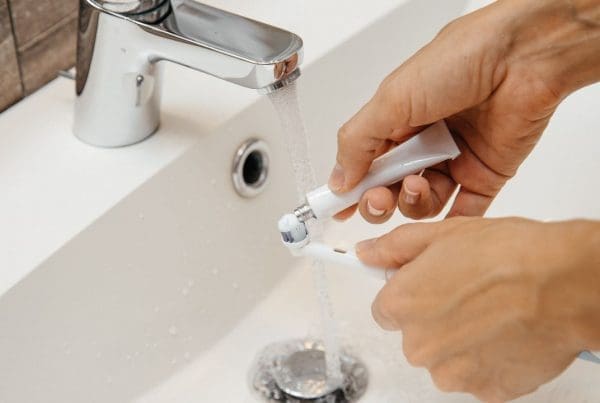If you’ve ever taken a shower in your home, you know that soap scum is real. That’s why it’s important to understand why it happens and what you can do about it. Soap scum is just one symptom of hard water—water that contains minerals like calcium and magnesium. Hard water is tough on plumbing systems, too: It can cause scale buildup inside pipes, leading to clogs and leaks. The good news? There are ways to mitigate soap scum build-up in your bathtub or shower stall. Whether you have city water or well water, here are the basics of how soap scum happens:
It’s not soap scum
 Soap scum is not caused by soap. It’s a misconception that a lack of cleanliness causes soap scum, but in fact, it’s the minerals in your water that cause this buildup.
Soap scum is not caused by soap. It’s a misconception that a lack of cleanliness causes soap scum, but in fact, it’s the minerals in your water that cause this buildup.
Soap does not dissolve into your tub or sink like you might think it does when cleaning up after yourself (or someone else). Instead, it sits on top of the surface and dries out over time—hence its name: “soap scum.” If you have hard water at home, this can happen more quickly than normal since minerals in hard water cling onto anything they come into contact with—including bars of soap.
It’s a mineral scale.
Soap scum is a buildup of soap and oils that stick to surfaces. Mineral scale, however, is not the same thing as soap scum. Mineral scale is a buildup of minerals from hard water in your pipes, showerhead, and faucet aerators (the little screen you clean out with vinegar).
When you take a bath or shower with hard water, it leaves behind mineral deposits on everything in your bathroom—including your tub. These deposits form almost immediately after a bath or shower because they contain dissolved minerals like calcium carbonate, which sticks easily onto other surfaces like glass or tile grout lines.
You can clean deposits using an anti-fungal product like CLR Bathroom Cleaner & Deodorizer, which contains an acidic formula that will dissolve those pesky mineral deposits without damaging tiles and grout lines, walls, etc.
City water usually contains hardness minerals.
Hardness minerals are calcium and magnesium. They’re present in many water supplies, even city water. Municipal water suppliers don’t usually soften their water before sending it to your home.
Well water usually contains hardness minerals.
Wells typically contain more calcium than surface sources like lakes and rivers because they’re underground and protected by layers of rock that filter out some of the minerals before they reach your home. While this makes them good sources of drinking water, it also means they’re high in calcium—and calcium is usually what causes soap scum.
The minerals in hard water form a deposit on the surfaces of your bathtub and shower stall.
Minerals in the water cause hard water. The minerals are calcium and magnesium, which can form a deposit on the surfaces of your bathtub and shower stall. If you have hard water, this will happen to you.
Scale can build up inside pipes, too.
Hard water buildup inside pipes can cause them to corrode faster than normal soft water pipes. Scale is a mineral deposit that builds up inside lines, and scale can cause leaks, corrosion, and other problems. Scale can be removed with a pipe cleaner or water softener. Hard water can cause scale buildup in pipes, leading to leaks and clogs.
You may not see or feel it, but the scale is there because the minerals in hard water cling to surfaces.
Scale is a mineral deposit that forms on surfaces, and it’s usually calcium carbonate, but it can also be any other mineral. In hard water, scale forms because when you take a bath or shower, and the water evaporates, it leaves behind minerals from your tap water. These minerals stick to your tub or shower walls (or sink), creating an invisible layer of soap scum over time.
How can I mitigate soap scum?
 Water Softener — A water softener will eliminate the excess minerals in your water, contributing to soap scum. Water softeners are a great way to improve the look and feel of your skin. Soap scum and hard water can leave your skin feeling dry and itchy. The minerals in hard water can even clog pores, which can cause acne. A water softener will also help prevent scale buildup on your shower head, faucets, and other plumbing fixtures. Scale buildup will eventually clog up pipes, so removing it is important for preventing future problems with plumbing issues.
Water Softener — A water softener will eliminate the excess minerals in your water, contributing to soap scum. Water softeners are a great way to improve the look and feel of your skin. Soap scum and hard water can leave your skin feeling dry and itchy. The minerals in hard water can even clog pores, which can cause acne. A water softener will also help prevent scale buildup on your shower head, faucets, and other plumbing fixtures. Scale buildup will eventually clog up pipes, so removing it is important for preventing future problems with plumbing issues.
If you have hard water at home and want to remove the mineral buildup that causes soap scum and other problems with your skin and plumbing, consider installing a water softener. Here are some things you should know about how a water softener works:
A water softener uses ion exchange to remove excess minerals in your drinking water—Ion exchange works by passing hard water through a bed of resin beads. The calcium and magnesium in the water attach to the resin beads, and sodium ions (from bags of salt) fill the void left behind by the hard minerals. When enough water passes through the resin beads, it’s time to regenerate the unit and flush out any remaining hard minerals.
Water Filters — Certain water filters can also help reduce the amount of soap scum that forms on your bathtub surfaces. Carbon water filters are great at removing chlorine and other chemicals from your water. They also come in various sizes to find the right one for your home.
Carbon filters work by combining activated carbon with water. The carbon absorbs impurities such as chlorine, dissolved metals, and organic compounds. This allows the filtered water to taste better and look better when it comes out of the faucet.
Some carbon filters can also help reduce the amount of soap scum that forms on your bathtub surfaces.
Carbon filters may not be able to remove all impurities from your water supply, so it’s still important to use bottled water if you suspect there may be contaminants in your water supply.
Distilled Water — Distilled water is another way to prevent soap scum from forming as easily; however, this method may not be feasible for every household because it requires an additional appliance and adds cost to your monthly budget.
Cleaners — Lastly, many bathtub cleaners are available at home improvement stores or online, claiming they’ll eliminate all traces of soap scum from your tubs (and sometimes even from tile grout). While these cleaners work well for some people, others find their products don’t live up to their promises after several applications. These cleaners are only reactions to the problem of scale and buildup—they don’t actually solve it.
Hard water, soap scum, bathtub scale, and water filters are different types of water stains found in the home. Calcium and magnesium ions in the water cause hard water stains. Soap scum combines soap residue and other minerals that build up over time as you use your products. Bathtub scale is created when minerals like calcium or magnesium combine with other elements such as sulfur or iron. Water softeners and filters remove impurities from your water supply, giving you clean drinking water.
Water stains are the bane of any homeowner’s existence, but they don’t have to be! Soap scum, hard water, and bathtub scale can all be reduced or eliminated by making sure you’re using a high-quality water softener and filter in your home.
There are plenty of ways to get rid of water stains in your home—but the best way is to prevent them from happening in the first place—just give C and J Water a call today!




